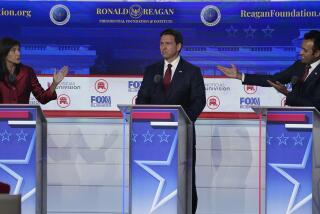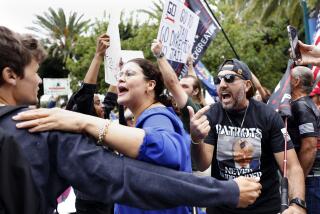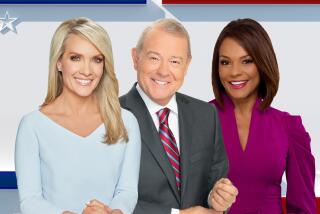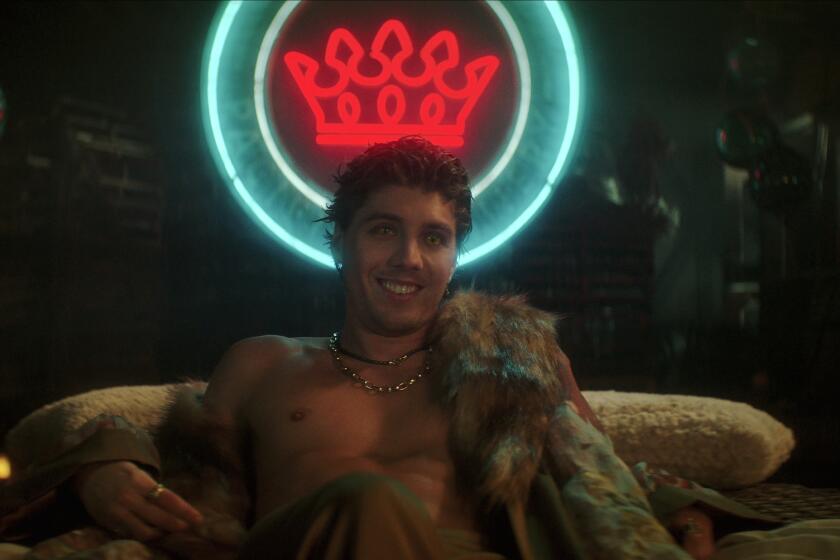Republican convention’s noteworthy media moments few, far between
Clint Eastwood’s impact on Mitt Romney’s campaign remains to be seen, but his digressive speech — and the frenzied response to it — will almost certainly be the most memorable media moment to emerge from what had been, until Thursday night, a Republican National Convention notable for its predictability.
Earlier in the week, the biggest “story” of the convention seemed to be Hurricane Isaac. On Sunday night, as the storm swirled ominously toward the Gulf Coast, broadcast TV producers faced a dilemma: How to cover the potentially devastating event while also giving adequate attention to the Republican gathering?
For CNN’s Anderson Cooper and Fox’s Shepard Smith, both of whom distinguished themselves with their tireless reporting on Hurricane Katrina in 2005, it was a no-brainer. The anchors grabbed their branded windbreakers and set out for New Orleans, leaving the vast majority of their colleagues in sweltering but safe Tampa, Fla.
PHOTOS: Celebrities stumping for Barack and Mitt
Hurricane Isaac underscored the formidable task for news organizations in covering any modern political convention. Largely devoid of their one-time historical import in which leaders were actually determined, the conventions have now become a huge non-event that chews up three to four days of the prime-time schedule.
“The convention is a spectacle,” says Richard Wald, media professor at Columbia University Graduate School of Journalism and a longtime TV news producer. “It’s a very interesting spectacle, but it’s not a great news event.”
These days, perhaps the biggest challenge for journalists — an estimated 15,000 of whom descended upon Tampa this week at a ratio of seven members of the press for every delegate — is how to cover something that is essentially an infomercial. Conventions are more tightly scripted and aggressively spun than ever, and the competition for viewer eyeballs and big interview “gets” has only intensified.
INTERACTIVE: Republican National Convention speeches
“There’s not a lot of surprises left in convention coverage,” acknowledges Ingrid Ciprian-Matthews, vice president of CBS News. “But you have to look at it from the view of the public. We consume this on a daily diet in the election year but for folks at home it’s their first time to focus on the election.”
Complicating matters further is the lack of excitement felt by voters on both sides of the spectrum: In 2008, some 40 million viewers tuned in to watch Sarah Palin speak at the Republican National Convention. About half as many watched Paul Ryan on Wednesday night.
This leaves broadcast journalists with two less than ideal options, argues Jeff Jarvis, editor of the media website Buzzmachine.com and a professor at the City University of New York. “If you fancy yourself a straight news reporter, you repeat the pap you just heard. If you’re a commentator, you’re competing with the population on Twitter,” he says. “There’s essentially no legitimate way for a journalist to add value.”
PHOTOS: Lessons from the campaign trail on film
In order to stand out, Jarvis claims, media personalities have to resort to histrionics. Witness MSNBC commentator Chris Matthews, whose dressing down of Republican National Committee chair Reince Priebus during an appearance on “Morning Joe” went viral early in the week. Matthews, incensed by Romney’s ill-advised birth certificate joke and alleged distortions of Obama’s welfare policies, accused the GOP of race-baiting.
The pressure to be noticed is even tougher on relatively new faces, like CNN’s Erin Burnett, says Politico columnist Dylan Byers. “People have made up their minds about who they like in the media: people on the right watch Fox, people on the left watch MSNBC. There’s a brand recognition.”
Given the tightly scripted nature of the convention, it follows that most of the noteworthy media moments from this year’s gathering took place off-camera. On Tuesday, convention attendees verbally attacked an African American CNN camerawoman.
The following day, Yahoo News Washington bureau chief David Chalian was swiftly dismissed after comments he made suggesting the GOP was “not concerned” about African American victims of Hurricane Isaac were caught on a hot mike during a webcast of Tuesday’s proceedings.
Then there was former vice-presidential candidate Sarah Palin, who took to Facebook on Wednesday to complain that Fox News had canceled three scheduled interviews with her.
One thing that did make it to air was a 10-minute video biography about Romney, highlighting his close-knit family, career at Bain Capital and successful turnaround of the 2002 Salt Lake City Olympics, although the video was bumped out of the 10-11 p.m. hour to make way for Eastwood and his empty chair. As Republican strategist Steve Schmidt noted on MSNBC, it was the first time since 1984 that a candidate’s biography was not broadcast in prime-time network television.
PHOTOS, VIDEO AND MORE:
PHOTOS: ‘Dancing With the Stars: All-Stars’: Meet the cast
London Olympics: The Games, our way
VIDEO: Watch the latest fall TV trailers here
More to Read
The complete guide to home viewing
Get Screen Gab for everything about the TV shows and streaming movies everyone’s talking about.
You may occasionally receive promotional content from the Los Angeles Times.





